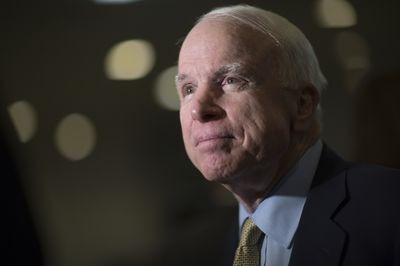Trump Win on Health Plans Advances Effort to Undo Obamacare
The Trump administration can expand the sale of short-term health insurance policies that don’t meet the standards of the Affordable Care Act, a federal judge ruled, advancing the government’s efforts to undo Obamacare.
U.S. District Judge Richard Leon in Washington rejected challengers’ claims that policies sold under a government regulation that took effect in October 2018 unlawfully undermine the ACA.
Trouble for Republicans?
Congress passed the ACA, a milestone of President Barack Obama’s administration, in 2010 to make comprehensive coverage more widely available regardless of a consumer’s pre-existing health conditions. Friday’s ruling allows insurers to offer far cheaper plans to healthy people, freed from those protections and requirements.
That could lead to higher premiums for people in ACA-compliant plans by siphoning off healthier consumers from the ACA risk pool over time -- and potentially to a political headache for Republicans on an issue that fueled the Democratic takeover of the House last year.
The judge based his ruling partly on the elimination of the individual-mandate tax penalty in the GOP’s 2017 tax law. Some Republican senators have since said they didn’t intend their vote to undermine protections for people with pre-existing conditions.
Susan Collins of Maine was the only Republican to vote for a Democratic resolution opposing the short-term plan regulation in October.
“It is essential that individuals who suffer from pre-existing conditions are covered,” she said then.

Two years after the late Senator John McCain gave the thumbs-down to his Republican colleagues’ effort to repeal the ACA, the court case underscores the quickening tempo of President Donald Trump’s efforts to undo his predecessor’s signature legislative achievement.
Health Care Drumbeat
In March, another federal judge in Washington rejected the administration’s attempt to permit small businesses to band together to offer “association health plans” exempt from ACA rules, calling it “an end run around the ACA.” The same month, a third judge struck down administration-backed policies in Kentucky and Arkansas that required many people on Medicaid to work in order to maintain their eligibility for the health program for the poor.
Meanwhile, a federal appeals court in New Orleans is weighing a request to overrule a Texas judge’s decision late last year to strike down the ACA in its entirety, a move supported by the Justice Department.
“Today’s court decision is a clear victory for American patients who saw their costs rise and choices disappear under the Affordable Care Act,” Health and Human Services Secretary Alex Azar said in a statement Friday. “President Trump has shown that we can open up dramatically more affordable options for Americans who buy their own insurance while still always protecting patients with preexisting conditions.”
House Democrats, for their part, passed the Strengthening Health Care and Lowering Prescription Drug Costs Act this summer “to block the Trump administration’s cynical expansion of junk health plans,” House Speaker Nancy Pelosi said in a statement. “The GOP Senate must act on this bill to protect and strengthen the health care of the American people.”
Alternative to Obamacare
Those suing to overturn the Trump administration’s short-term health insurance regulation -- among them the American Psychiatric Associaton, AIDS United and the National Partnership for Women and Families -- argued that the rule thwarts Congress’s intent by permitting the plans to last as long as 364 days and to be renewed for three years. The Obama administration had limited them to three months. Leon heard arguments in the case on May 21.
The rule could create a longer-lasting alternative to ACA coverage that might lure healthier patients away from Obamacare, undermining the risk pools it depends on in offering its more comprehensive coverage, the plaintiffs argued. An attorney for the administration countered that there was a demand for policies cheaper than Affordable Care Act plans and that their availability hadn’t drawn people away from ACA coverage.
“No legislation pursues its purposes at all costs,” Leon wrote in rejecting the plaintiffs’ arguments. “To be sure, the ACA’s various reforms are interdependent and were designed to work together as features of the individual exchange markets. However, Congress clearly did not intend for the law to apply to all species of individual health insurance.”

The initiative to expand short-term coverage arose in 2017 after the Senate failed in its push for ACA repeal. In an executive order, Trump called for expanding access to short-term coverage, describing those policies as exempt from the ACA’s “onerous and expensive insurance mandates and regulations.”
Unlike Obamacare plans, the short-term policies don’t have to cover a standard set of essential benefits, and can be substantially cheaper. They also don’t have to pay out a minimum of 80% of the premiums they collect on medical care, an ACA rule that applies to other health insurance. Companies offering the plans can refuse to insure people with pre-existing medical conditions.
Those practices were typical of the individual insurance market in many states before the ACA came along. Obamacare was intended to end them but permitted short-term plans to remain on the market.
At the end of 2017, about 122,000 Americans were enrolled in short-term medical plans, according to data from the National Association of Insurance Commissioners. Trump’s policy could dramatically expand the market. Federal actuaries estimate that 600,000 more people might purchase short-term coverage in 2019 because of the rule.
House Democrats have derided short-term plans as “junk” insurance. The House Energy and Commerce Committee in March announced an investigation into 12 companies selling short-term policies.
The case is Association for Community Affiliated Plans v. U.S. Department of Treasury, 18-cv-2133, U.S. District Court, District of Columbia (Washington).